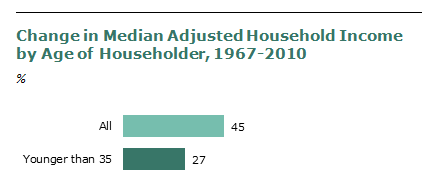
That’s the scalp of a man who mixes 2 parts vinegar to 5 parts bar soap residue to create his own shampoo.
We’re running out of adjectives to describe this halfwit. Or synonyms for halfwit, at any rate.
Maybe Trent Hamm of The Simple Dollar fancies himself as the self-help guru for our generation and generations to come. Or, judging by his cornpone naivete, for previous generations. But even Napoleon Hill never wrote like this a century ago. He would have found Trent Hamm’s style of writing a little too expository and vacuous. Yet Trent Hamm remains convinced that he’s giving his readers something worthwhile when he pulls a passage such as this out of his, well, passage:
Take a thorough shower and clean yourself as much as you can. Use underarm deodorant as well. Cleaning yourself properly is the most valuable aspect of your personal appearance.
For a mother with an especially stilted manner, this is wonderful advice to give to her 8-year-old son, if they happen to live in Victorian England.
But Trent Hamm is a 30-something American who claims to function in the modern world. People actually read this dunderhead. By the way, his stratagem about taking showers (and using underarm deodorant) comes from the same invaluable post in which he tells us to brush our teeth.
We don’t want to ruin the ending for you, but there’s something in there about flossing and using mouthwash, too. With a clean body and a clean mouth (courtesy of Trent’s handy homemade toothpaste, no less), you’re ready to start the day. No, wait. One more thing:
Use a fragrance that smells good to you every day. For my own use, I have a small collection that I freely alternate between on a daily basis; I like every one of them that I use in this rotation. Among these are Eternity, Emporio Armani, Dreamer, Dolce and Gabbana, Acqua di Gio, and Platinum Egoiste.
Where do we start? It’s going to require a few lines of pensive thought, represented by white space, to attack this in the proper fashion. You don’t eat an elephant in one bite.
Should we begin with the laughable grammar? No, that’s too easy. Let’s move on, but not before pointing out that you can’t “alternate”, freely or under orders, “between” only one collection.
Okay then, what about his penchant for filler? “I like every one of them that I use in this rotation.” Really? That’s odd. Most people hate the smells they choose to smother themselves in. No, still too easy. Come on, dig deeper.
Jesus H. This is a man who can write 2000 words on how if you’d started buying off-brand chicken bouillon cubes instead of those fancy Oxo ones the day the first trilobite walked out of the ocean during the Cambrian period, you’d have saved 4¢ by now. Yet he owns 5.9 more bottles of cologne than does the average man of non-Mediterranean descent. (Hamm, for what it’s worth, is as WASPy as a mud dauber.)
Seriously, who the hell wears cologne? Prices, on Google Shopping:
| Eternity | $12 |
| Emporio Armani | 50 |
| Dreamer | 33 |
| Dolce & Gabbana | 45 |
| Acqua di Gio | 62 |
| Platinum Egoiste | 79 |
We know a quick and easy way for the comically cheap Trent to save $281 on his cologne bill.
Let’s not forget that most of Hamm’s readership is female and has limited use for this advice. Unless he’s openly soliciting Christmas gifts from his readers, which we wouldn’t put past him.
However, if you are a woman and you ever have the following conversation with a man:
You: (sniffs) What is that?
Him: Oh, I’m wearing Dolce & Gabbana,
do humanity a favor and repeatedly kick that man in the vulva so hard that he loses all his senses except smell.
STOP RIGHT THERE.
Guys, you probably think that you take the bottle of fragrance (or as normal humans call it, cologne) and pour it on your chest and stomach. Why? Because you’re a The Simple Dollar reader and thus must have suffered cranial trauma at some point. But don’t worry, Uncle Trent has a safe (and frugal!) method for applying cologne. You too can smell like the men’s room at ghostbar. Here’s how:
Don’t apply them by spraying, just spray a bit on your hand and rub behind your ears and the sides of your neck with your moistened hand; this creates just the right level of fragrance for both men and women…
a) “Don’t apply them by spraying, just spray”
b) Who doesn’t have at least a semblance of an idea on how to apply cologne? Your humble blogger did it once, at his First Communion, and never forgot.
c) If you made it to adulthood (or at the very least, an age when reading The Simple Dollar interests you) without knowing how to apply cologne, there’s no hope for you if you’re taking advice from a disembodied fat man’s voice on this piece of sheep feces that masquerades as a functional blog.
Trent continues:
…and it also prevents you from wasting it, meaning you’ll have many more applications per bottle.
There is nothing that Trent Hamm can’t turn into a ode to frugality. We wish we’d been there the day Trent and the long-suffering Madame Hamm tried to conceive their first child:
Her: What are you doing? I’m ovulating! Get it in there!
Him: Honey, we don’t want to waste it. We could save it for future applica–
Her: It regenerates inside you! And guess what? IT’S FREE!
Him: (ejaculates)
Buy only clothes that go well with the majority of other clothes in your wardrobe. I own only ten dress shirts and eight business casual pants and I work in an environment where business casual is a strongly expected mode of dress, yet I manage to regularly elicit comments on how well dressed I am.
And that is the biggest lie that has ever been told.
Scroll back to the top of the page and get a good look at him. Breathe it all in, that shimmering example of masculine couture. No one, except possibly the clerk at the Goodwill store where Trent puts these ensembles together, has ever commented on how well dressed he is.
Furthermore, no one is this egotistical. Not even Deion Sanders would brag that people tell him what a sharp figure he cuts. Unless Trent is trying to be funny, but how is this humor? Where’s the payoff? Or is it all setup? For a clue, here’s a quote from February 10 of last year:
When I finally realized that the things I actually needed were incredibly minimal, I began to see how amazingly abundant my life was.
…I had reasonably good health. I had wonderful children. I had a good sense of humor.
In his defense, he did use the past tense. So maybe there was a time when he indeed had a good sense of humor. Notwithstanding that “I have a good sense of humor” is one of the two self-contradictory sentences in semantic logic, the other being “This sentence is false.” Explicitly stating that you have a good sense of humor negates the possibility of you having one.
Whenever Trent’s sense of humor might have existed, it had to have been before he started The Simple Dollar. Because nowhere on that site is there anything approaching wit, wordplay, or even lightheartedness. We’ll send an autographed copy of Control Your Cash: Making Money Make Sense to the first person who can find a funny line anywhere in The Simple Dollar archives*.
*Line must be intentionally funny. There goes your free book.





